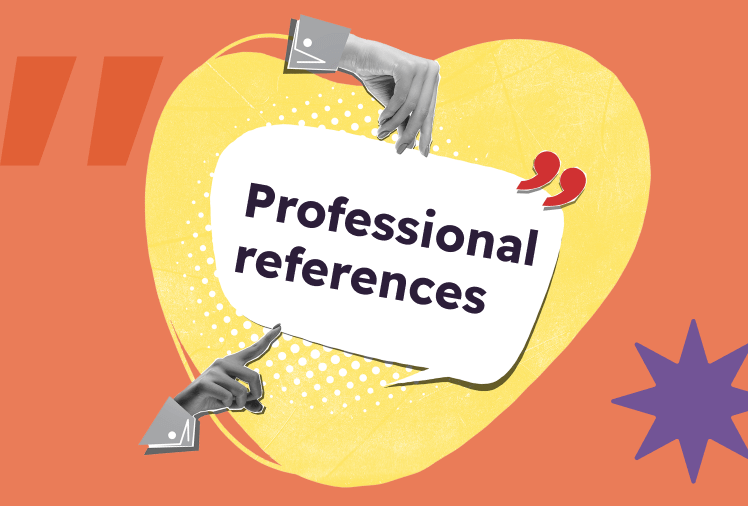Professional references are people who can speak to your work experience, skills, and overall character as a professional. These references can be contacted by potential employers as a way to get more information about you as a job candidate.
Professional references are typically past or current supervisors, colleagues, or clients who can provide a review of your work and your ability to do the job for which you are applying.
It is vital to choose professional references who can speak positively about your qualifications and who will present you in a good light to potential employers.

Table of Contents
Types of Professional References
Here are some examples of professional references:
- Previous supervisor: This could be a former boss or manager who can speak to your work ethic, skills, and ability to take on responsibility.
- Colleague: This could be a coworker who worked with you on a team or project and can speak to your collaboration skills and contributions to the company.
- Client: If you have worked with clients in the past, they can be a good choice for a professional reference. They can speak to your ability to meet their needs and deliver results.
Tips to List Professional References
- When creating a list of professional references, better choose individuals who can speak to your work experience and qualifications in a positive manner. These individuals should be able to provide specific examples of your skills and accomplishments, as well as explain how you contributed to their organization. It’s generally best to choose references who have a higher level of authority, such as a manager or supervisor, as they are more likely to have a more comprehensive understanding of your work and can provide a stronger recommendation.
- When providing professional references, it’s important to inform the individuals beforehand and obtain their permission. This allows them to be prepared to speak about you and your work, and ensures that they are willing to be a reference. It’s also a good idea to provide the individual with a copy of your resume and the job description for the position you are applying for, so they can tailor their comments to the specific skills and experience the employer is seeking.
- It’s also a good idea to have a diverse group of references, including individuals from different organizations and job roles. This can help provide a well-rounded view of your skills and experience, and shows that you have a range of professional relationships and have had a successful track record in various roles.
How to Ask for a Professional Reference
Asking for a professional reference can feel intimidating, but with a bit of preparation and the right approach, it’s possible to make the request in a respectful and professional manner. You might say something like:
Hello [Name],
I hope this message finds you well. I am reaching out because I’m currently applying for a new job and am in the process of gathering professional references. I’m wondering if you would be willing to serve as a reference for me.
I have really valued the opportunity to work with you in the past, and I believe that you have a good understanding of my skills and experience. I believe that your endorsement would be very helpful as I pursue this new opportunity.
If you are willing to serve as a reference, I would be happy to provide you with a copy of my resume and the job description for the position I am applying for.
I would also be grateful if you could let me know if there is any specific information you would like to discuss or highlight in your recommendation.
Thank you in advance for considering my request. I look forward to hearing back from you.
Sincerely,
[Your Name]
Follow up if necessary: If you don’t hear back from the individual within a week or so, it’s okay to send a follow-up message. Keep in mind that people are busy and may not have had a chance to respond to your initial request. A polite follow-up message can help remind them of your request and ensure that they have the necessary information to provide a reference.
Thank the individual: Once you have received the reference, it’s important to thank the individual for their time and effort. A brief email or message expressing your appreciation can go a long way in maintaining a positive professional relationship.
Read also a complete guide on how to ask for a reference.
How to List Professional References on Resume
- Create a separate section on your resume specifically for your references. You can title this section “Professional References,” “References,” or “Recommendations.”
- Choose your references carefully. It is best to choose people who can speak to your skills, qualifications, and work ethic.
- Use a consistent format for each reference. You can use a bullet point list, or set the references off with a block of text.
- For each reference, include the person’s name, job title, company or organization, phone number, and email address. If you have a personal relationship with the reference (such as a family member or friend), it is also appropriate to include your relationship to the person.
Here is an example of how you might list professional references on your resume:
References:
Jane Doe, Manager, ABC Company, (123) 456-7890, jane.doe@abc.com
John Smith, Director, XYZ Organization, (987) 654-3210, john.smith@xyz.org
Mary Johnson, Senior Supervisor, DEF Group, (456) 123-7890, mary.johnson@def.com
Final Thoughts
Overall, professional references are individuals who can speak to your work experience, skills, and qualifications for a job, and can provide specific examples of your abilities and accomplishments.
It’s important to choose references who have a high level of authority and can provide a strong recommendation, and to inform them beforehand and provide them with relevant information about the job which you are applying for. A diverse group of references can also be beneficial, as it can provide a well-rounded view of your skills and experience.